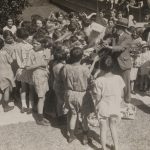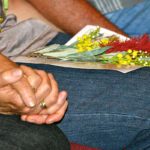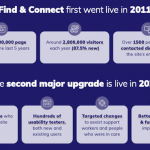'Your mum wrote every week'
- Jun 24, 2016
- In Features
I have brought my list of records, from several orphanages, DOCS, different places…I’ve been looking for my family for 40 years. I went back to Broken Hill, in fact I dragged my family all around the state. Searching my grandmother’s photos, hoarding them – everything was important to me.
(Sam* talking at Find & Connect workshop, 2014)
The records held by past providers are vitally important to Care Leavers seeking to understand their own past, and are potential evidence for individual legal action and enquiries such as the Royal Commission into Institutional Responses to Child Sexual Abuse.
Access to records is a key step to restorative justice, and organisations can show their commitment by being transparent about the records they hold.
The Records Access Documentation Project (RADP) was funded in 2012-3 by the Department of Families, Housing, Community Services and Indigenous Affairs (FaHCSIA) to improve access to records about Forgotten Australians and Former Child Migrants. It formed part of the wider suite of Find & Connect Service and projects.
RADP offered cash grants of up to $15,000 to eligible not-for-profit organisations to document, index and release records relating to children placed in Homes, orphanages and other forms of out-of-home ‘care’ during the 1920s–1980s. Priority was to be given to funding past providers with records for release which were likely to have the greatest impact for Forgotten Australians and Former Child Migrants. A particular focus was put on the records of Care Leavers for whom there was no surviving government information.
One of the Grant requirements was that documentation about the collections should be made publicly available via the Find & Connect web resource. Another focus was on implementing or improving ‘supported release of records’, or a more empathetic approach to access.
29 non-government organisations across Australia applied and all received Grants. A team of archivists from the Find & Connect web resource project were responsible for providing tools, training and support to these organisations.
The Find & Connect archivists developed a simple cataloguing tool which could be used and understood by those with only a basic level of archival training and limited resources. The first iteration of this tool was presented as part of half day training workshops. As well as explaining the tool, the training covered some basic archival theory. Although there were a handful of archivists among the participants, for the majority this information would have been new.
As the project progressed we were able to give more direct help to those organisations which needed it, assisting in project planning and analyzing current practice and information capture. We developed training videos and material which, along with the archival indexing tool, are freely available online. See Resources for Record Holders page.
The web resource team gathered information from RADP participants and created, updated and expanded entries about records and related organisations on the Find & Connect web resource. The kinds of records they documented included admission and discharge registers, minute books, annual reports, photographs, personal files and other information that could shed new light on personal histories and help to piece together childhoods.
In the final stages of the project we ran another series of workshops around the country with Care Leavers, the RADP participants, other record holders, and, support services.
The participating organisations were proud of the contribution they were making to this importance cause. They reported that the project had markedly improved their access service. One organization explained the impact of the project:
The project reduced our response time for records requests from 6 weeks to 3 days. We catalogued and condensed our holdings. Information about a person is spread amongst different boxes. We found duplicates and found boxes that were ‘air’ – which we were paying storage for! We’ve related documents to each other: admission registers, health records etc. Now when we search we can find everything where a name may appear. We found lost history that would have been sitting in a box somewhere and no one would have known if it wasn’t for the grant.
The most powerful voice is that of Care Leavers, and we always started the workshop by hearing from a Care Leaver as a way of framing our days’ discussion. I’d like to leave you with these words from Sharon* who spoke at one workshop. Sharon got her records when she was thirty and found out that her mother had written to her regularly from when she was a baby to ten years old. She was given just a sample of those letters:
All my life I’d been told my mother was nothing but a drunken whore who worked the streets for a living and didn’t care for us. When I got them, I was thirty and she was dead, there was a stack of letters from when I was one till I was about ten. He [the ‘record holder’] said “Oh look, there were probably a hundred of those, your mum wrote every week, but they were very repetitive, stating ‘I love you’, how she wanted you back, over and over.” I found out none of it [what I had been told] was true, there was nowhere for me to go for apologies.
*Note: the names of individuals have been changed to protect their privacy





